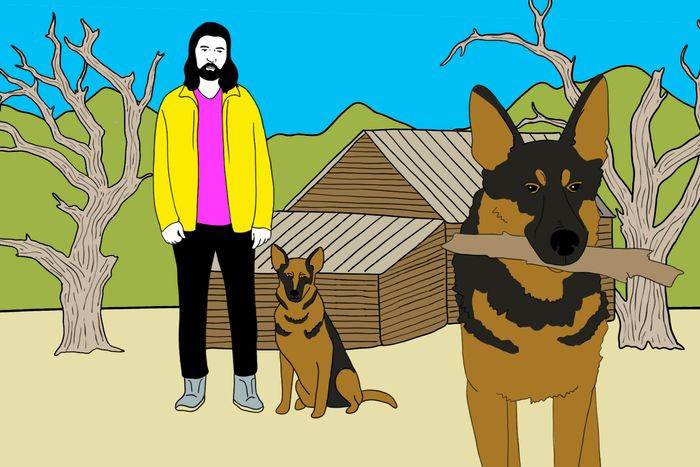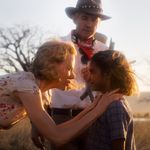
Earlier this summer at the Newport Folk Festival, a collective text message rocked the crowd: Noah Kahan had to drop out at the last minute due to a vocal injury. I heard a collective sigh of disappointment, and I looked up to see the entire audience with their faces aghast. Which makes sense: As the summer transitioned to fall, the Vermont-based artist was suddenly everywhere — on TikTok, performing on SNL and alongside collaborators like Post Malone and Hozier. His take on folk blends place-based stories of New England loneliness with a driving pop sensibility he gained from his years working in the Los Angeles session scene.
As a fellow New Englander with a love for string music, I wanted to speak with Kahan about carrying the mantle of folk music with all of its genre-specific expectations. Our conversation turned into a discussion of his work, an impromptu guitar lesson, and an opportunity to vent about the overuse of folk sounds in car commercial music. Soon after we chatted, he was nominated in the Best New Artist category at the Grammys. Listen to my conversation with Noah Kahan on the latest episode of Switched on Pop below, or read on for an excerpt of our conversation.
Your song “Stick Season” was an unexpected breakthrough success and a real change of pace from your earlier material. Tell me how “Stick Season” came about.
So I was in Los Angeles recording my second album, I Was / I Am, and I was in this pop space, making anthemic pop music. There’s always some folk-pop elements, but I definitely felt like I was more in the pop space and I was falling out of love with it as a style of songwriting. The process was no longer enjoyable to me. I didn’t feel like I was capturing enough of myself in the music and I felt like I was just going through the motions.
I was working with an incredible producer, but I would go home after sessions at the studio and write folk songs for myself because I grew up listening to Paul Simon, James Taylor, Cat Stevens, and the Avett Brothers. These songs were what made me love music, and so when I started to fall out of love with the music I was making professionally, I would try to go back to being inspired by artists like that, writing songs that could give me a little bit of that love and that feeling of passion again. Those songs were just for me. I really wouldn’t play them for anybody else; it was just a way to keep music my own. I felt like I was losing control of my own love for music, and like my passion was being sent in the wrong direction.
Is there something about the assembly-line nature of the L.A. songwriting scene that contributed to that?
Yes, for sure. Being in the studio and walking into a room, there’s an expectation to finish something or start something else. Some days I’ll be so dissatisfied when I’m working by myself that I won’t even start anything. I actually like that better because I know that I’m working toward something great, whereas in L.A. there’s this feeling of clock in, clock out, “What do you want to write about today?” And I think I started to focus more on impressing the people I was writing with, or impressing my A&R, rather than making myself like the song or writing something that represented me at that moment.
I interview all kinds of folks who love that sort of system. It works for some people. It doesn’t work for others.
I think it worked for me for a while but then it stopped. Also, in L.A., everyone starts at like 2 p.m. And you’re working from like two to eight. I’m like, Dude, I don’t wanna have dinner at your house. I like to feel like I have a real job, even though I don’t. I’m like, Let’s start at nine and work until three or four. That’s as much creativity as I have. Don’t catch me at my least creative time, which is mid-afternoon lunch, into my hungriest time, which is dinner, into my most food-comatose time, which is after dinner.
So I was getting tired of that, and in the meantime I was writing these folk songs that reminded me of the music I loved growing up and the place I grew up in. I was homesick. When I was home, I wanted to leave and when I was gone, I wanted to be back. I was writing a song about that. I put the verse onto TikTok and then was kind of like, This isn’t very good. Maybe I should delete this. But I ate a weed gummy and fell asleep before I could delete it. I woke up the next morning, and it had a ton of views.
Had you established much of a TikTok presence at this point?
Kind of — I was building it, but not in a very intentional way. I was just posting little snippets and things. And I had a huge following — huge for me — since 2017. So, there’s people that knew me on TikTok, but I don’t think I’d reached a larger mainstream audience at that point.
But I woke up and the song had some legitimate momentum. So I walked into the kitchen and I wrote a chorus for it, and posted the chorus, and then walked away, and then the chorus blew up as well. And suddenly we had half of a song that people were really loving. It made me question what I was doing overall. The song I wrote that made me happy in my Airbnb is really doing well on TikTok, and this stuff that I’m working on all day and that the label supports isn’t moving the needle for me emotionally, and I’m not sure if it’s even moving the needle for me commercially, either. It made me reconsider. So I dove into “Stick Season” as a song and as an album with a new perspective and a feeling that maybe this was the better path.
How would you describe the genre or feel of the song?
I was hoping to make “Stick Season” almost in the Pinegrove alt-folk space, but it found its way into Lumineers territory in a lot of ways. I think I would describe it as a folk-pop song, in that it’s very contained in the sense of a pop song — verse, chorus, verse, chorus. There’s not a ton of room for music, but the anthemic feel and the imagery is Americana and folk. I was singing about a place, singing about the countryside, and singing about feeling left behind in a way that felt anthemic and, to me, felt folkier.
I’m curious how you conceive the signifiers of Americana and folk versus the signifiers of pop?
I think pop sacrifices story for universality. It makes a trade-off. You are trying to reach as many people as possible with a concept that is relatable. It’s supposed to be more immediate. That comes from the melodies and the production choices, which are supposed to capture attention; whereas I think folk music is supposed to focus on story and whatever telling the story requires. And if that means space and nuance, that’s what happens. Whereas with pop music, the goal is to do it as quickly and as immediately as possible. That’s not to say it’s a bad thing, it just requires drastically different approaches.
This album sits at the crossroads between the two. There’s a lot of specific imagery. The chorus on “Stick Season,” when you talk about “the season of the sticks” — tell the story of where that imagery comes from.
The term “stick season” I’d actually used in a song that I was writing a few years before, another one of those songs that I was just writing for myself, and I wrote it during stick season in Vermont, which is actually this time of year — late October, mid November. The trees are all leafless, and it’s gray outside, and it hasn’t quite snowed yet but the ground is hard as hell, and there’s brown grass and patches of dirt, and it’s a really depressing time of transition.
As someone who grew up in this environment, why do you think it’s important for people to label it?
Because it lasts long enough that you have to confront it with some kind of label. It’s like a month of time, and it’s very clearly not autumn anymore, but it’s also not quite winter yet. Saying autumn or winter feels wrong. Vermont, as a culture and as a community, is a specific place and wants to find words to describe what it’s like to live here. When people think of Vermont, they think of trees and beautiful foliage or snow in the wintertime. There’s a lot more going on there. People say there are six seasons. There’s winter, mud season, spring, summer, fall, stick season, and back to winter. I think it helps people who don’t live there understand what it’s like. And it helps people who live there represent what’s happening in the moment.
I saw Olivia Rodrigo did a cover of “Stick Season” on BBC. The two of you have written alternative realities of the same concept in “Driver’s License” and “Stick Season.” The feeling of using the road as a metaphor for a past relationship. Do you feel that there’s any kind of kindred connection between these two very different songs?
Yeah, I think so. They both play on a feeling of being left behind. Olivia, or the narrator in that song, feels left behind in a relationship, and details the feeling of when you’re revisiting a place you were with somebody, but you’re no longer with them, and it feels like the place got its meaning from the relationship you had. In “Stick Season,” the narrator’s spending a time in a relationship in Vermont, and then when that person leaves, it feels that the whole place loses its meaning. It looks worse and looks grayer and the season affects you more because you’re no longer with the person that got you through it.
Driving to me has always been a metaphor I’ve used because it’s such a huge part of growing up in New Hampshire and Vermont. I have to drive 25 minutes to the gas station or to get groceries and drive 25 minutes back. If I want to go hang out with my friends, I’m driving from Stratford to New Hampshire. That’s 45 minutes. So much of my time is spent in the cars that it really informs my life experience.
You coined a great term in one of your songs, “Northern Attitude.”
Yeah. Someone said in a TikTok comment when I wrote the song “Homesick,” which is about the specificities of living in a small town in New England, “people in New England will change your tire for you if you’re stuck, but they won’t say a word to you the entire time.” And I’ve always felt that to be very true. People will help you out, but they’ll be pissed off. They’re brusque, but they’re all kind, deep down.
There’s a very specific love language going on there, and I’m always trying to draw that out of people. Even when I play shows, I’m more nervous to play a show in Vermont or New Hampshire than I am to play a song about New England in Missouri because they assume that I’ve captured the experience, whereas in Vermont, they know what this place is like. I hope I nailed it, and I hope that I am not misrepresenting this place to people who are from here.
You said that you grew up listening to the likes of Paul Simon and James Taylor, yet you begin in a sort of more pop, indie-pop, folk thing. You made this record that has really connected with folks but seems positioned as more Americana folk. Is there a scene that you’re drawing from or music that is either heard or performed at home around your region?
I don’t know if I was drawing on any particular scene from Vermont. I drew a lot from other artists, for sure. There are a couple records that really helped aid the imagery of Stick Season, Sam Fender’s Seventeen Going Under, for one. That record really painted a picture of where he was from and what it was like to grow up there. Totally different from where I grew up, but I felt like I was there. I think that’s a magical thing, to hear someone’s unique life experience, and be like, Okay, I feel like I kind of get it.
Phoebe Bridgers’s Punisher is another great record that maybe isn’t necessarily about a place, but she draws on a very specific life experience in each song. There’s imagery of different places she’s lived or been, or relationships she’s been in, that are so specific to her own life experience, but feel so relatable to so many. She does it in such a way that you almost have a feeling of voyeurism. Looking into something and being like, Whoa, it’d be cool to be there, but you can never be there. On tour, we’ll go through towns, and I’m like, I just want to be a part of this town. I want to be a local here. There is a tension of not quite being able to, but feeling like you’re right there and so close to being a part of it. Those albums made me feel that way, and I wanted to draw on that feeling for my record.
I think if I were in a decision-making position at a label, I would think, Okay, album about Vermont, Americana pop-folk thing, that scene happened a decade ago. Right? There was Lumineers, Marcus Mumford, Fleet Foxes. I’m curious about how you feel about those comparisons and if you feel any expectations of carrying that torch.
I’ve always found it really interesting that the cultural pendulum swung so far away from that. I think that there’s some unfinished business there.
They had to go to Avicii for a minute.
They’re like, All right, we still want a little bit of the folk stuff, but it can’t be the overalls anymore. Onstage, I’m fully leaning into it, though. I always loved that music so much. And then it kind of went away and it became lame and corny. Maybe I’m a bad person for liking that music, but I really enjoyed it. It made me feel happy. There was enough depth that I could feel like I was hearing something important within it.
I think we got a lot of car commercial music that was derivative of that. Especially when it went hard ukulele. Not in the historical usage of the ukulele, but in strumming corporate ukulele.
Oh, yeah. That was too much. I totally agree, but I think the Lumineers and Mumford and Sons in particular received an undue amount of hate for making music that I thought was good. I won’t speak for the thousands of runoff bands. But when I was making these songs, I feel like I wasn’t necessarily thinking, Let’s make something like Lumineers or Mumford and Sons, I was just thinking, Let’s make something anthemic on the acoustic guitar, and I think that’s what they were doing, so that’s how it ended up sounding.
Hopefully, what’s moved forward is the storytelling, and lyrics that speak to some more modern problems. Loneliness, isolation, especially during COVID, grappling with our relationship to our parents and families, I think these are very relevant themes. And with Olivia Rodrigo, big emotional heart-on-sleeve ballads were kind of making its return. There were a lot of factors that made it the right place, right time.




